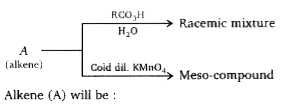Assertion: Alkenes are easily attacked by electrophilic reagents.
Reason: Alkenes are unstable molecules in comparison to alkenes.
If both assertion and reson are true and reason is the correct explanation of assertion
If both assertion and reason are true but reason is not the correct explanation of assertion.
If assertion is true but reason is false.
If both assertion and reason are false.
The correct Answer is:B
To solve the assertion and reason question, let's break it down step by step.
Step 1: Analyze the Assertion
Assertion: Alkenes are easily attacked by electrophilic reagents.
- Alkenes contain a carbon-carbon double bond (C=C), which is a region of high electron density. This makes alkenes nucleophilic in nature, meaning they can donate electrons.
- Electrophilic reagents are species that seek electrons and can react with nucleophiles.
- For example, when ethene (C2H4) reacts with bromine (Br2), the double bond attacks the bromine, leading to the formation of 1,2-dibromoethane. This confirms that alkenes are indeed easily attacked by electrophilic reagents.
Conclusion for Assertion: The assertion is true.
Step 2: Analyze the Reason
Reason: Alkenes are unstable molecules in comparison to alkanes.
- While it is true that alkenes are generally more reactive than alkanes, the statement that they are "unstable" is misleading. Alkenes are more reactive due to the presence of the double bond, which is a weaker pi bond compared to the sigma bonds in alkanes.
- Alkanes (like ethane) are saturated hydrocarbons and do not have double bonds, making them less reactive than alkenes. However, this does not mean that alkenes are "unstable" in a general sense; they are simply more reactive due to their structure.
Conclusion for Reason: The reason is true, but it does not correctly explain the assertion.
Step 3: Determine the Relationship
- Both the assertion and the reason are true statements.
- However, the reason provided does not adequately explain why alkenes are more reactive than alkanes.
Final Conclusion
Based on the analysis:
- Both the assertion and reason are true, but the reason is not the correct explanation of the assertion.
Answer Option
The correct answer is: Option B - Both assertion and reason are true, but reason is not the correct explanation of assertion.
---
Assertion: Alkenes are easily attacked by electrophilic reagents.
- Electrophilic reagents are species that seek electrons and can react with nucleophiles.
- For example, when ethene (C2H4) reacts with bromine (Br2), the double bond attacks the bromine, leading to the formation of 1,2-dibromoethane. This confirms that alkenes are indeed easily attacked by electrophilic reagents.
Reason: Alkenes are unstable molecules in comparison to alkanes.
- Alkanes (like ethane) are saturated hydrocarbons and do not have double bonds, making them less reactive than alkenes. However, this does not mean that alkenes are "unstable" in a general sense; they are simply more reactive due to their structure.
- Both the assertion and the reason are true statements.
- However, the reason provided does not adequately explain why alkenes are more reactive than alkanes.
Based on the analysis:
- Both the assertion and reason are true, but the reason is not the correct explanation of the assertion.
The correct answer is: Option B - Both assertion and reason are true, but reason is not the correct explanation of assertion.
Topper's Solved these Questions
- HYDROCARBONS BOOK - NCERT FINGERTPS ENGLISHCHAPTER - HYDROCARBONS EXERCISE - Alkanes
25 Videos
- HYDROCARBONS BOOK - NCERT FINGERTPS ENGLISHCHAPTER - HYDROCARBONS EXERCISE - Alkenes
25 Videos
- HYDROCARBONS BOOK - NCERT FINGERTPS ENGLISHCHAPTER - HYDROCARBONS EXERCISE - Higher Order Thinkin Skills
7 Videos
- EQUILIBRIUM BOOK - NCERT FINGERTPS ENGLISHCHAPTER - EQUILIBRIUM EXERCISE - Assertion And Reason
15 Videos
- HYDROGEN BOOK - NCERT FINGERTPS ENGLISHCHAPTER - HYDROGEN EXERCISE - Assertion And Reason
15 Videos
Similar Questions
Knowledge Check
Assertion : Alkynes are less reactive than alkenes towards electrophilic reagents
Reason : General formula of alkenes is CnH2n-2
a.If both Assertion and Reason are CORRECT and Reason is the CORRECT explanation of the Assertion.
b.If both Assertion and Reason are CORRECT but Reason is not the CORRECT explanation of the Assertion.
c. Assertion is CORRECT but Reason is INCORRECT.
d.If Assertion is INCORRECT but Reason is CORRECT.AIf both Assertion and Reason are CORRECT and Reason is the CORRECT explanation of the Assertion.BIf both Assertion and Reason are CORRECT but Reason is not the CORRECT explanation of the Assertion.CI Assertion is CORRECT but Reason is INCORRECT.DIf Assertion is INCORRECT but Reason is CORRECT.
Alkene (A) will be :Acis-2-penteneBcis-2-hexeneCcis-4-octeneDtrans-2-hexene
Identify the incorrect statement / statement :
(i) Alkynes are more reactive than alkenes towards electrophilic addiction reaction
(ii) Alkynes are less reactive than alkenes towards electrophilic addiction reaction
(iii) Alkynes decolourise Br2 water
(iv) Addition of HBr to alkenes in presence of peroxide proceeds via Markownikoff's rule
View SolutionGeneral formula of alkenes is
View Solutionwhat is a Z alkene ?
View SolutionReagent used to test unsaturation in alkenes is
View SolutionWhich reagent used to test unsaturation of alkenes ?
View SolutionAssertion : The presence of Ag+ enhance the solubility of alkenes
in water.
Reason : Alkenes are weakly polar in nature.
View Solution
